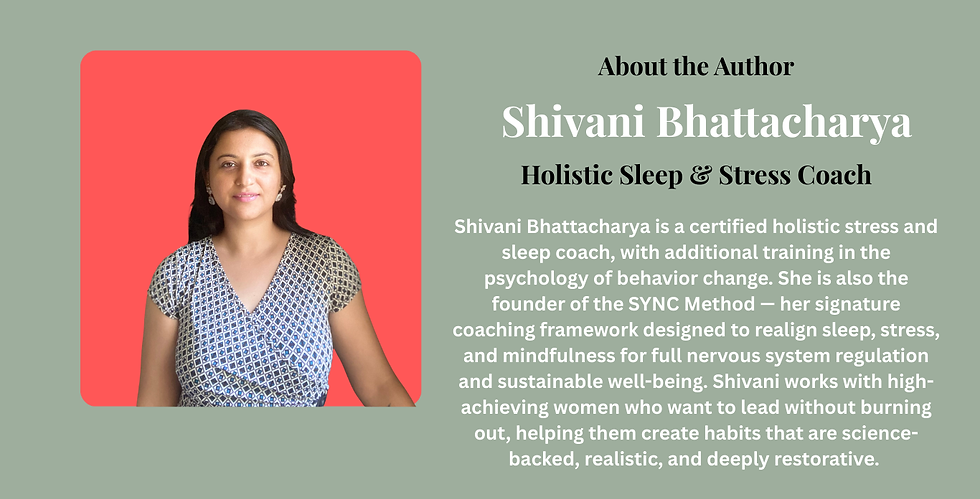Brain Fog in Women: My Brain Feels Foggy All the Time — Is It Stress or Hormones?
- Shivani Bhattacharya
- Jun 14, 2025
- 5 min read

You’re on your third cup of coffee before noon.
Still, it feels like your brain is moving through molasses. You stare at your screen, reread the same email three times, and still can’t make sense of it.
The mental sharpness you used to pride yourself on feels... dulled. If you're a high-performing woman, this isn't just inconvenient — it's frightening.
And when no amount of rest, to-do lists, or supplements make a difference, the question naturally arises:
Is this stress? Or are my hormones to blame? Or both?
Let’s unpack what might really be happening.
What Brain Fog in Women Really looks like
"Brain fog" isn’t a clinical diagnosis, but it’s a phrase women use to describe an experience they know all too well: mental cloudiness, difficulty concentrating, forgetfulness, and a general sense of not being as "on it" as they used to be.
Some describe it as:
"My memory feels shot."
"I start one task and forget why."
"Even conversations feel mentally exhausting."
In reality, brain fog is often your brain's way of telling you something is out of balance. And more
often than not, stress and hormones are at the center.

How Chronic Stress Contributes to Brain Fog
High-functioning women often run on adrenaline — always moving, doing, deciding. But this constant hustle means your body is stuck in sympathetic overdrive (fight or flight mode), with chronically elevated cortisol levels.
Here’s what stress does to your brain:
Impairs memory and attention (thanks to hippocampus shrinkage)
Disrupts sleep (which worsens cognitive clarity)
Increases inflammation (slowing down neuron communication)
The kicker?
You might not even feel "stressed" because you’ve normalized this high-output mode. But your body hasn’t.
Imagine trying to focus with your foot constantly on the gas pedal. That’s what your nervous system feels like.
And if you add in modern lifestyle stressors — deadlines, caregiving, decision-making, performance pressure — your nervous system rarely gets a chance to reset.
The Hormonal Wildcard
Now add fluctuating hormones to the mix.
Estrogen, progesterone, thyroid hormones, and even insulin — all play a role in brain function. When these are even slightly out of sync, your cognition suffers.
Women in their late 30s to early 50s are particularly vulnerable to this hormonal rollercoaster:
Estrogen supports serotonin and acetylcholine (crucial for mood and memory).
Progesterone has a calming effect and helps with restorative sleep.
Thyroid hormones regulate energy metabolism in the brain.
When these start dipping or fluctuating, the brain's performance naturally follows.
Ever noticed your fog worsens before your period or after a poor night’s sleep? That’s your hormonal rhythm waving a red flag.
Hormonal changes can affect:
Your ability to multi-task
How quickly you process information
Your emotional bandwidth (especially around your cycle)
Where Stress and Hormones Collide
Stress doesn’t just live in a vacuum. It messes with your hormones too.
Chronic cortisol suppresses progesterone.
Poor sleep throws off your insulin.
Emotional burnout affects your HPA axis (the brain's stress center).
This is why many women are told, "Your labs are normal," yet they still feel off.
This intersection of burnout + hormonal imbalance is what I call the fog zone. And the only way out is to address both — not just one.
How Nutrition and Blood Sugar Add to the Fog
Let’s not overlook a big hidden player: blood sugar instability.
Skipping meals, relying on caffeine, and sugar crashes all mess with your brain’s ability to focus.
When your glucose dips too low, your brain feels the effects instantly:
Sudden fatigue
Anxiety-like symptoms
Irritability
Many high-performing women unintentionally skip meals or eat imbalanced snacks. This creates blood sugar spikes and crashes that worsen both hormonal and nervous system regulation.
Simple fix: Think protein + fat + fiber every 3-4 hours. It’s not about dieting — it’s about fueling your brain.
Why Brain Fog Is Often Misunderstood by Doctors
One of the most frustrating experiences for women dealing with chronic brain fog is being dismissed.
You might hear:
“Maybe you’re just tired.”
“It’s probably perimenopause.”
“Try meditation.”
While well-intentioned, these suggestions miss the point. Your symptoms are real — and your body is asking for support, not platitudes.
Functional and integrative health practitioners often look beyond surface-level labs. They explore adrenal function, micronutrient deficiencies, gut health, inflammation markers, and hormone metabolites.
This holistic lens can finally validate what you’ve known all along — that the fog is not in your head. It’s in your system.
What You Can Actually Do
Let me introduce you to something I call The SYNC Method™.
This is a nervous system-led approach to untangling stress and hormone chaos, so your body and brain stop fighting each other.
Some simple first steps:
Start your day with nervous system regulation (light movement, breathwork)
Anchor your mornings and evenings with rituals, not rush
Track your sleep, energy, and fog patterns — they reveal hormonal clues
Rule out common issues like low ferritin, hypothyroid, insulin resistance
Add magnesium glycinate or adaptogens (with professional guidance)
And most importantly: stop blaming yourself. This isn’t a mindset issue. It’s a physiological one.
Why High-Achievers Struggle More

Because you’re always on. Always pushing. Always giving.
Your body has learned to perform under stress, but it hasn’t learned to recover from it.
Recovery isn’t just sleep. It’s:
Allowing white space in your calendar
Saying no without guilt
Creating tech boundaries
Knowing your "signal drop" moments and honoring them
When you train your body to slow down — even in micro moments — your hormones begin to stabilize, and your mind gets clearer.
Client Story: From Foggy to Focused
One of my clients, Riya, a senior HR executive, came to me saying she felt like she was “constantly underwater.” Words would slip her mind mid-sentence. She started avoiding high-level meetings because she didn’t trust her sharpness anymore.
Within 6 weeks of using The SYNC Method™:
Her sleep improved by 90 minutes each night
She stopped relying on 3 cups of coffee to get through the day
Her morning meetings were once again her strongest zone
The change wasn’t overnight, but it was consistent. We addressed her nervous system tone, regulated her blood sugar, tracked her cycle, and added strategic supplementation. The fog began to lift.
What If You Could Clear the Fog for Good?
Imagine:
Waking up clear-headed and calm
Making decisions swiftly
Ending your day with energy to spare
This isn’t a fantasy. It’s possible once you bring your nervous system and hormones into sync.
Or, if you're ready to talk it out, book a free 30-min clarity call with me. Let’s map this together.
You’re not broken. You’re just out of sync. And that’s something we can work on — together.









Very well written Shivani, you have added many important points that the doctors and therapists often miss or skip.